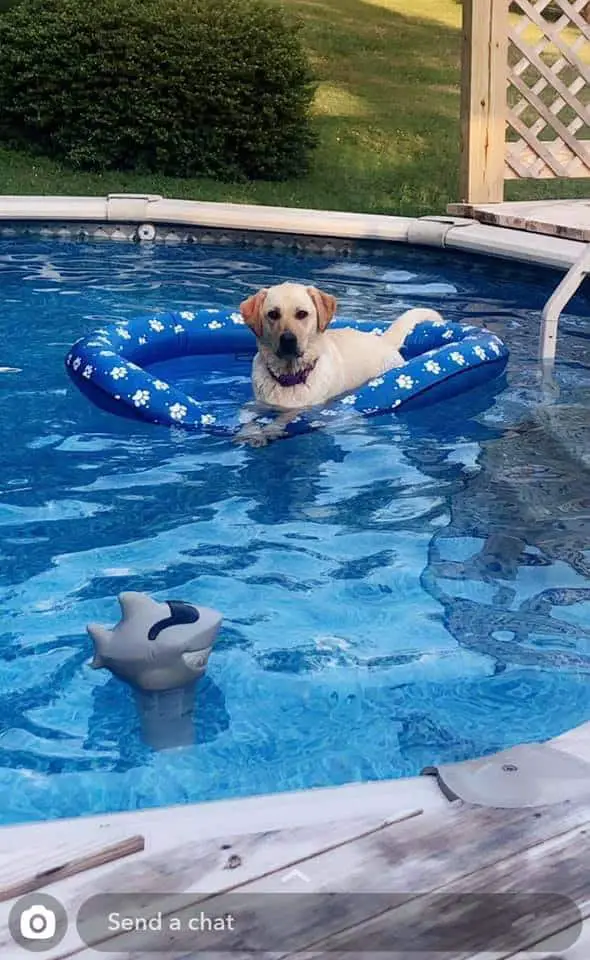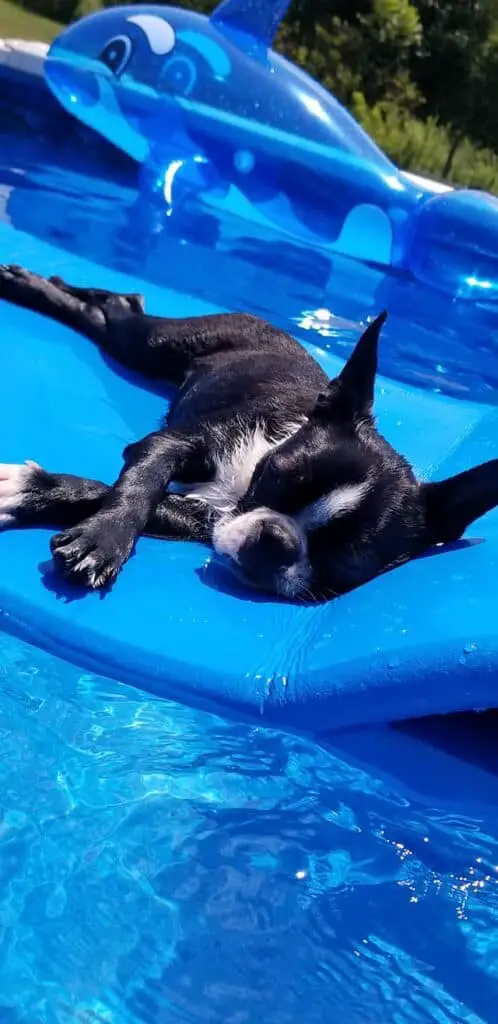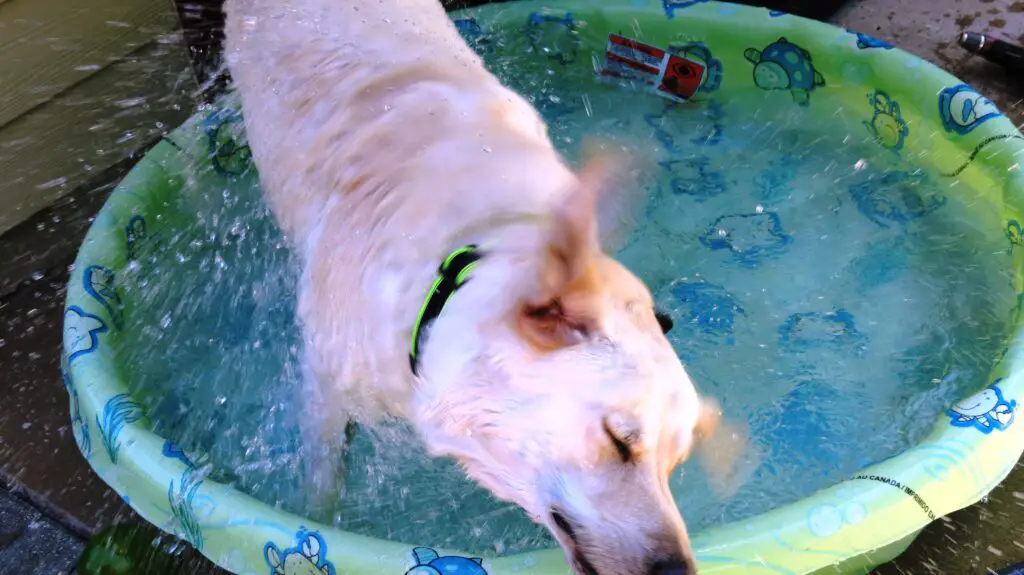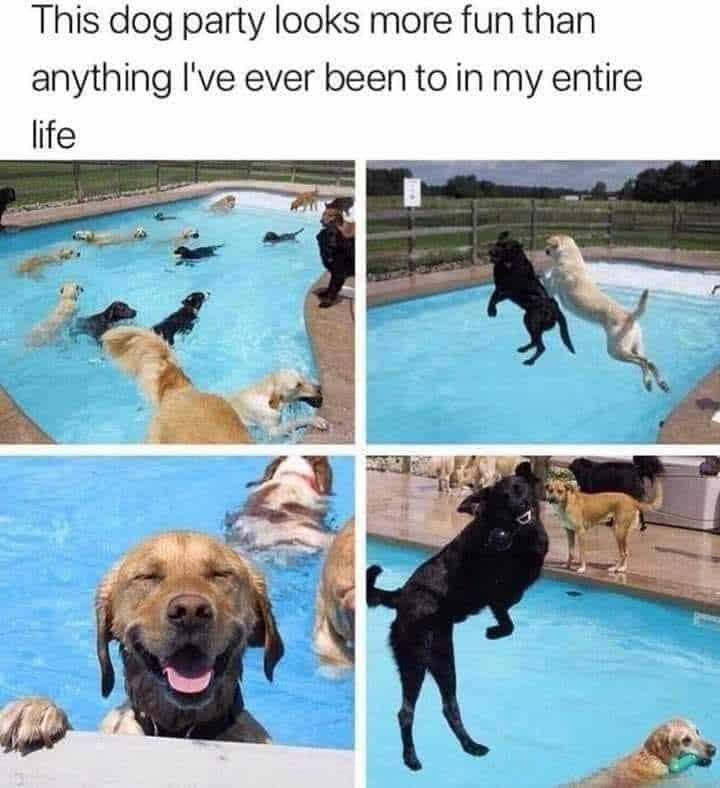


For most Americans, their dogs are a big part of the family. In other parts of the world and with other cultures, this isn’t the case. In the US though, people treat their dogs like their kids.
So, with pool owners, it’s natural to assume that their dogs are going in the pool. Here then, are a few things I’ve learned about dogs and above ground swimming pools.
Most dogs enjoy swimming in the family pool. With above ground pools though, you do have to be concerned with them paddling against the liner, causing tears.
ABOVE GROUND POOLS SPECIFICALLY FOR DOGS
Earlier this year, I got a call from a lady who wanted her pool installed. She had purchased a 12’ round pool and, after attempting to install it herself, deciding to call me to do it.
This was a small job for me and she lived pretty far away and it was my busy season, so I was reluctant to do the job. When I told her she was too far from me and that I wasn’t interested, she broke down and told me why this pool was so important.
Her mother had just passed away a month before and she was now taking care of her old dog. “This pool is for my mother’s dog”, she explained. “My mother had a pool and her dog used to swim with her. The dog is thirteen years old and probably doesn’t have long to go, so I just want her to be able to swim like she used to with my mom”.
As this lady told her story, she began to cry. So after telling me that she tried to put the pool up herself but couldn’t, and that I was the only one she could find that installs pools, I had no choice but to put her on the schedule.
Over the many years of building above ground pools (34 years and counting), I have installed quite a few pools for people’s dogs. Here are a few of the reasons that they gave me:
A FEW REASONS WHY PEOPLE GET ABOVE GROUND POOLS FOR DOGS
1 To give their dog exercise
Swimming is excellent exercise for dogs. Many people have dog breeds that require a lot of physical activity. So, instead of walking them three times a day and constantly having to play “ball” with them, some will choose to get a pool for their hyper-active dogs.
Also, some with aging dogs that need regular physical activity to help keep their ailments at bay will use an above ground pool.
2 So their dogs can cool off

It almost doesn’t matter where you live, summers months are hot. Many people who have their dogs living mostly outside will be concerned with them getting hot.
Also, some large or hairy dog breeds can get overheated very easily. My sister had an English Mastiff that weighed 220 pounds. She was an awesome dog, but here in Florida, there was no way she could be an outside dog. She was just too big and bread for colder climates.
Having a pool available for a hot dog is great for the dog. And they will use it to cool off on their own.
3 Because they have “water dogs”
Certain dog breeds love water. Some love their dogs so much that they make sure that they have a pool to swim in.
There are dog breeds that wouldn’t do well without consistent water activity. Taking your dog to a lake on a regular basis can be too time-consuming for some, so having a pool for them to swim in instead is ideal.
4 Because they have competition dogs
There’s this sport called “dock jumping”. This is where you throw a toy over the water, and the running dog jumps out into the water toward the toy. The distance the dog jumps before hitting the water is recorded.
I once built a 15×30 oval above ground pool for a guy that had two “dock jumper” dogs. He built a special deck on one side of it and used it to train his dogs for this competition.

10 THINGS TO CONSIDER WITH DOGS AND ABOVE GROUND POOLS
It’s rare that people will get an above ground pool just for their dogs. With almost 90 million dogs in the US alone though, most that get pools will have a dog or two. Here are ten things to consider when having dogs and having an above ground pool.
1 Dogs can tear the liner
This is by far the biggest concern with dogs swimming in above ground pools. Everything is fine except when they doggie paddle too close to the side of the pool and their paws scratch against the wall and vinyl. The dog’s claws can cause tears in the liner.
To prevent this, most will train their dog to not swim too close to the pool’s edge or just train them to not hit the wall of the pool with their paws. Most dogs are smart enough to be trained not to do this.
Others who don’t or can’t train their dogs will just keep an eye on the dog while in the pool to make sure he/she doesn’t scratch the pool walls. Others will have a shield in a specific area against the liner which prevents any damage if the dog paddles his paws against the pool wall.
Dogs damaging above ground pool liners is fairly common. When someone calls me and says that their pool is losing water, one of the first things I ask is if they have a dog swimming in the pool. The good news is that if your dog did make some holes or tears in the liner, they will always be high up and close to the surface of the pool.
Tears or holes from dog paws can be hard to see. It can also be hard to tell if they are there at all if the tears are high up the wall so that they are above the waterline.
If you suspect that you have some dog-related holes in your liner, fill the pool up higher than normal and turn off the pump to allow the water to get still. Preferably from the outside of the pool, go all the way around the pool and very closely inspect the liner just above and below the waterline. Holes made by dogs paddling will only be at the top of the pool.
It’s important to find and patch these holes as they cause water to leak into and stay between the inside of the pool’s wall and the liner, which eventually causes corrosion to the wall.
2 Most dogs can swim
Some dog owners getting a new pool will worry about how their dog will handle being in the pool. Most dogs will have no issues with swimming, but some will need to kind of learn.
One of my sisters had two dachshund (hot dog) dogs. Strangely, one could swim and one couldn’t. Even though the vast majority of dogs can swim, you never know. When first bringing your dog in the pool, keep an eye on him and make sure he/she knows how to swim. Chances are that even if the dog has a hard time at first, he will pick it up quickly and love being in the water.
3 Having access for dogs
Most above ground swimming pools are in fact, above the ground. This means they will have a ladder to get in and out of them or they will have a deck build next to them with stairs for access. Most dogs can’t climb ladders well, so consider this if your pool will be out of the ground and you don’t have a deck.
As in the case of the elderly or swimmers’ physical restrictions, some will build a small deck and stairs for those who can’t climb ladders. Some will do this for their dogs too.
In some cases, people will have a pool partially in the ground and they want to prevent their dogs from entering the pool. For this, installing an above ground pool fence will do the trick. This is two foot tall fencing that is attached to the pool’s uprights and will do a good job to prevent unwanted swimmers(like your dogs) from entering the pool.
4 Having a rest or landing area for dogs
Even though most dogs have a high level of energy, if in the pool long enough, they will need to rest from paddling. Grown humans in above grounds can just stand up to rest, but small kids and dogs cannot.
The best thing that can be used as a rest area for swimming dogs is the wedding cake type or other pool steps made for above ground pools. These bigger steps will give the dog a place to rest without having to tread water. Oh, and it’s good for small children too .
5 Dogs will dig around the outside of the pool
Even though this has nothing to do with dogs being inside the pool, this is worth mentioning. Dogs get hot outside. And when they do, they will dig holes in the earth and lay in them to cool off.
Many times, dogs will elect to dig these holes directly next to the pool. This can be bad if the dog digs a hole under the pool.
When having an above ground pool and dogs, you can prevent this by laying down mulch or rocks around the outside perimeter of the pool. This will deter the dog from digging next to the pool and go dig a hole elsewhere.
6 Dogs are part of the family
There may be some soon to be pool owners that are thinking their dog won’t be going in the pool. In some cases, people won’t allow their dogs in the pool or the dog won’t like water and won’t get in.
For the most part though, people will want to have the dog in the pool as part of the family. So, if you are thinking the family dog won’t be getting in, consider that other family members will think the opposite and want the dog in the new pool.
7 Dogs swimming for physical therapy
I once had a beautiful German Shepherd. He was strong and protective but like many, got hip dysplasia. Many dogs will get or have conditions that require some physical therapy. And just like for humans, a swimming pool is a great place for physically rehabbing dogs.
8 Swimming pool water is safe for dogs
For the most part, dogs are unaffected by pool water. Some dog breeds have sensitive skin and are prone to skin diseases. For those, extended exposure to heavily chlorinated water could dry their skin some and cause issues.
It very rare that pool water negatively affects dogs.
9 How swimming dogs affect the pool’s filter system
For sixteen years, I owned a pool maintenance company and worked a pool service route. Many of my pool service customers had their dogs swimming in their pools. The only thing that would be different in the servicing of their pools was having some dog hair in the pool filter. No big deal.
I did have a rich lady who used to occasionally wash her five dogs in her pool. A couple of times when she did that, the pool would need to be heavily shocked when I got there. The shampoo and dirt from washing the dogs would deplete the chlorine level in the pool.
This was an extreme case and that particular pool was chemically problematic to begin with. A normal, unproblematic pool would probably handle the washing of five large dogs with no issues. I’m not sure that I recommend that though.
There are some extreme situations with dog swimmers that can cause issues. For example, if someone had three or four sheepdogs that swam in the pool all the time, their collective hair loss may semi-clog the pump. For the most part, though, the average above ground pool with the average dogs swimming in it won’t affect the pool’s equipment at all. Filter-wise, If you have more than one big swimming dog, then I would go with a good quality cartridge-type. Learn about filter types here
10 Best above ground pool for dogs
For the most part, one above ground pool isn’t better for dog swimming than another. As in all cases, my advice is to get the thickest, best liner you can for it (which, among other things, will be tougher against dog claws). And cartridge type filters are best for cleaning out dog hair than sand or D.E type.
If you are getting a pool specifically for your dog or dogs, get a smaller one. Smaller pools are easier to keep clean and cheaper to operate. Plus, a dog doesn’t care how big it is.
